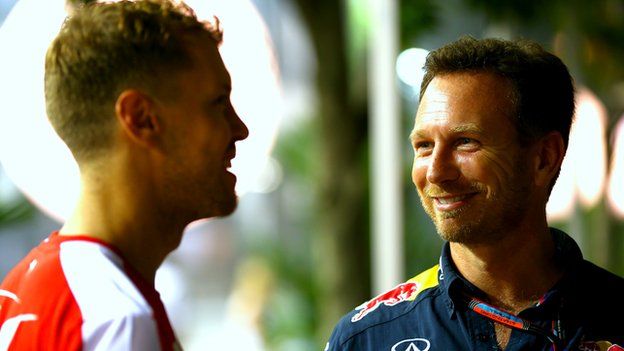British Grand Prix: Sebastian Vettel's red mist comes from 'killer instinct'
- Published

Red Bull boss Christian Horner knows how complex a character Sebastian Vettel can be
British Grand Prix on the BBC |
|---|
Dates: 14-16 July Venue: Silverstone |
Coverage: Practice and qualifying on BBC Radio 5 live sports extra (online only), and race on BBC Radio 5 live. Live text commentary, leaderboard and imagery on BBC Sport website and app. |
Sebastian Vettel's red-mist moments are caused by a killer instinct that means he is occasionally prepared to "win at all costs", says Christian Horner.
The Ferrari man is on a final warning from governing body the FIA after two 'road rage' incidents in seven months.
Vettel, 30, banged wheels with Lewis Hamilton in Azerbaijan last month and swore at race director Charlie Whiting over the radio in Mexico last October.
"Sebastian wears his heart on his sleeve," said Red Bull boss Horner.
"He is involved in a very intense battle. He sees an opportunity to be champion again this year and he knows he's going to need everything going his way against Mercedes to achieve that.
"He has zero filter between what he thinks and what he says or does sometimes. That's the great side of him. But sometimes it gets him in hot water as well."
Horner was Vettel's boss at Red Bull for six seasons between 2009 and 2014, and had to deal with some difficult moments in that time.
Vettel and team-mate Mark Webber crashed together in Turkey in 2010,, external while the German refused to obey team orders in Malaysia in 2013.
Controversial moment of the season so far: Vettel lets his frustration get the better of him in Baku
Horner likened Vettel's uncompromising attitude to that of his hero Michael Schumacher, whose controversial driving tactics clouded his reputation throughout his career.
"Sebastian has this huge desire within him," Horner said. "The records mean a lot to him. Michael Schumacher was very much his idol and I think what you see that bubbles over sometimes is that killer instinct of, 'I want to win'. Sometimes at all costs.
"It comes across as spoilt but I think you've got to put yourself in his scenario, in his shoes. He has lifted Ferrari from where it was to where it is now and he has been a big driver in that."
Horner said that the environment at Ferrari might be contributing to the increased number of such incidents involving Vettel.
"Ferrari are an emotional team - Latin origins - it probably fuels that emotion," Horner said.
"That's not to say it's a bad thing. It shows he's human at the end of the day and shows how hungry he is to achieve that ultimate goal.
"[Ferrari president Sergio] Marchionne has his own style of management. He's quite a full-on character, quite outspoken. And the demeanour of a team comes from the top. The people who lead the team set the tempo.
"You can feel Ferrari is a high-pressure place, particularly at this period of time."
When champions turn bad: who has seen the red mist over the years, and what did they do?
Horner said he felt Vettel could have been more severely punished for driving into Hamilton in Baku, an act motivated by the German's incorrect belief that the Mercedes driver had 'brake-tested' him.
Vettel was given a 10-second stop-and-go penalty but Horner said officials could have disqualified him for the incident.
"It's a difficult one, isn't it?" Horner said. "That's for the stewards to judge the penalties that were available to them. On the day it could well have been [a black flag]. Other drivers in other formulas have been and there's the precedent it sets.
"But they chose the penalty they had. I think what was wrong was then to drag it on. I think it's important that everybody knows on the day what is the result, what is the punishment for that action."
And he said that, away from the pressure of competition, Vettel was "a great character".
"You don't see as much of his character perhaps in his current environment," Horner said. "He is a fun guy, he loves British humour, he's very good with the mechanics, the team.
"I'm not the kind of guy who pushes the fault to one guy" was Vettel's response to colliding with Red Bull team-mate Mark Webber in 2010
"He'd turn up here with chocolates for the receptionists and girls around the factory, he was always very generous in terms of not just gifting something to the race team, but to the whole factory. He'd spend hours signing stuff and really investing into the team."
Horner said the title battle between Vettel and Hamilton had "a fascinating dynamic between two very different personalities and drivers".
"Lewis is a bit more of a free spirit," Horner said. "He has a huge amount of natural talent. He probably doesn't think about his talent… or his application is probably different to Sebastian.
"I have never worked with Lewis so I don't know but he relies on that natural instinct.
"He jumps in and delivers and he is a bit like an artist. You can see he has mood swings as well.
"Lewis is very out there, you know, lives the lifestyle that he does, whereas Sebastian is hugely protective and private, he almost enjoys a student-like existence. He is happy with his backpack and wants to keep family life very private and not let anyone know what he's doing away from the race track."
- Published9 July 2017
- Published27 June 2017
- Published26 June 2017